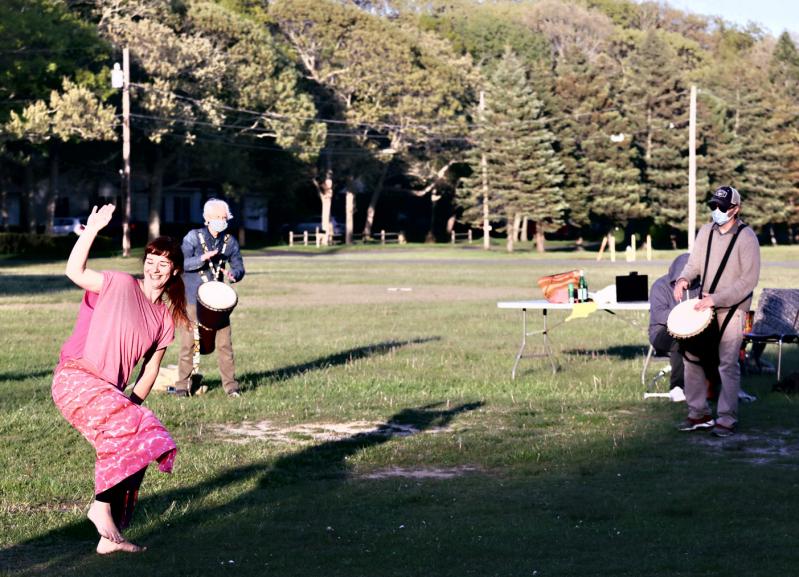There’s a traditional dance that originated in Guinea, West Africa, called the Djole. It literally means “masked dance.” It was usually danced by men wearing masks that made them look like women, but at present, one could think of it having a different meaning.
“How often do we put masks on to deal with certain things in our life, and how often do we take them off and feel vulnerable?” said Charity Joy Robinson, who taught the dance last Thursday on the lawn at the North Sea Community House for a small, socially-distanced group of students. “Considering we have to wear masks now, it’s very ironic.”
Instruction by Ms. Robinson, who teaches dance, yoga, and other types of movement privately and for the Ross School, is only one aspect of the weekly outdoor classes at the North Sea Community House. Kate Albrecht and Paul Murray, both experienced musicians, teach and perform different styles of African drumming. On Thursdays, they all come together for dance classes accompanied by live drummers.
“The drummers are playing a rhythm that coincides with the dance rhythm,” Ms. Robinson explained. “The drummers are our cue point. They tell us, with their sounds, when to start to move, when to break, where we move to the next step. I find the drumming aspect makes people listen a little more. It creates this really cool connection.”
She has traveled the world, from France and London to Korea and Japan to the Caribbean, learning the dances and languages of different cultures. Ms. Albrecht has studied and performed drumming in Morocco, Hawaii, South America, and Thailand. Mr. Murray, who teaches drumming and Mandarin at the Ross School, began studying drumming at the age of 7, and continued at Dartmouth College and while serving in the Peace Corps in Senegal.
“People everywhere know classic West African rhythms, and even if we don’t speak the same language, we play the beats we know and we are connecting,” Ms. Albrecht said. “The rhythm is inside each one of us. The drum brings it out — it brings joy.”
Prior to the Covid-19 pandemic, the classes were held inside the North Sea Community House. After a hiatus of more than two months, they moved outside,where a large grassy area can accommodate dancers and drummers spread out in a wide circle. Participants are barefoot, but are still asked to wear masks, of course.
Ms. Albrecht teaches a Dun Dun class, another dance style with cross-cultural roots, on Wednesdays from 6 to 7:30 p.m. A drumming class with Mr. Murray is on Thursdays from 4:30 to 6, followed by the combination dance-drumming class from 6 to 7:30. Admission is by a suggested donation of $10.
Under their masks, Ms. Robinson said, people are smiling. That’s just part of the satisfaction of teaching the classes.
“Each person who comes has their own individual path they’re on, whether they’re healing from chemo or excited to move their bodies,” she said. “People open up to me and say, ‘We really need this in our community. You’re doing an amazing thing.’ They are excited to come together and move and dance. I teach it in a way that there’s no judgement. It’s an open, free space to move.”
She does an inspirational reading before they start moving, for instance, “around full moon energy or about what this dance represents,” she said. Being outdoors is invigorating, she said, and the dances and drum rhythms range from ancient styles to more modern combinations.
“All of my experiences have brought me to this place where I want to invite people to enjoy moving their body,” Ms. Robinson said.

